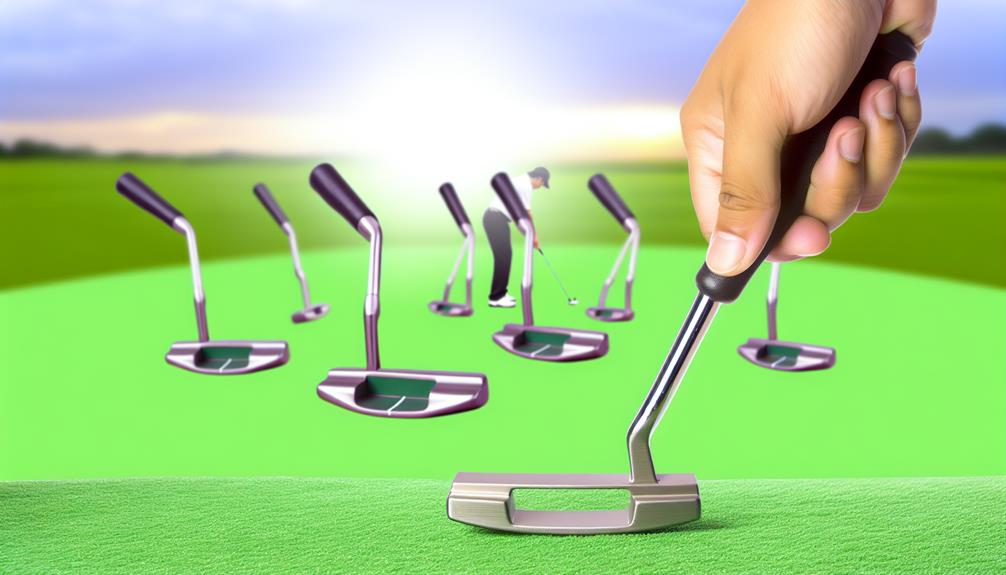So, you think any old putter will get you that hole-in-one, huh? Well, I hate to burst your bubble, but that's not quite how it works.
You see, selecting the correct golf putter isn't just about picking the shiniest one in the store. It's an intricate process that can significantly impact your performance on the green.
It's a lot like choosing a dance partner; you need the right fit, balance, and rhythm to hit that perfect swing.
If you've underestimated the importance of a good putter before, let's just say you're in for an enlightening journey.
Understanding Golf Putter Importance
You've got to realize that selecting the right putter is absolutely crucial to your golf game, as it's the club you'll use the most on the course. It's not just about the length or the weight, but also the materials and aesthetics that can influence your performance.
Putter materials are an essential factor to consider. They can range from stainless steel to carbon steel, aluminum, or even a combination of materials. Each material offers different feel and sound at impact, which can affect your confidence on the greens. Stainless steel putters, for instance, provide a more solid feel and are typically heavier, helping you maintain a steady stroke.
Putter aesthetics, on the other hand, play a psychological role. A putter that appeals to your eye can boost your confidence, ultimately influencing your performance. Some golfers prefer a classic blade-style putter with a simple design, while others lean towards mallet putters with more intricate shapes and alignment aids.
Factors Affecting Putter Selection
When choosing the perfect putter, it's crucial to consider several factors, such as your skill level, playing style, and personal preferences for weight, balance, and design.
Let's delve into 'Putter weight influence': a lighter putter helps you make a faster stroke, ideal for those slow greens. Conversely, a heavier putter slows down your stroke, making it perfect for fast greens. Therefore, it's essential to find a weight that fits your game and the conditions you typically play in.
Next is the 'Grip size impact': the size of the putter's grip can significantly affect your stroke. A larger grip helps reduce wrist action and promotes a more shoulder-dominant stroke, which can be beneficial for those struggling with consistency. Conversely, a smaller grip allows for more wrist action, which may suit players who prefer a more handsy stroke.
Effects of Putter Types on Performance
Building on the importance of weight and grip size, it's equally crucial to understand how different types of putters can dramatically affect your golfing performance. Putter Materials and Stroke Styles play significant roles in this aspect.
For instance, putter materials range from steel to brass, each offering distinct benefits. Steel putters, known for their consistency and feedback, often help seasoned golfers maintain control. On the other hand, brass putters, lighter and softer, suit beginners who need more forgiveness on off-center hits.
Moreover, your stroke style can determine the ideal putter type for you. If you have a straight stroke, a face-balanced putter is your best bet as it keeps the face square to the path. Conversely, a toe-balanced putter works well if your stroke has an arc because it allows the face to naturally open and close.
Tips for Selecting the Right Putter
Choosing the right putter can dramatically improve your golf game, but it's not always as simple as picking the shiniest one on the shelf. There are a few key factors you'll need to consider, such as putter budgeting and grip preferences.
Putter budgeting is crucial. You don't necessarily need to splurge on the most expensive putter. Instead, focus on finding a quality putter that fits within your budget. Remember, it's not the price tag that determines the effectiveness of a putter, but how well it performs in your hands.
Secondly, consider your grip preferences. The grip is your only contact with the club, so it's essential to choose a putter with a grip that feels comfortable and secure in your hands. Test out different shapes and sizes to see what feels best. Some golfers prefer a thicker, softer grip, while others like a thinner, firmer one.
Lastly, don't forget about the length and weight of the putter. These aspects significantly affect your stroke and overall control. By considering these aspects, you're not just buying a putter; you're investing in a tool that can help you shave strokes off your game.
Improving Game With Correct Putter
With the right putter in your grip, tailored to your budget, comfort, and playstyle, you're well-equipped to elevate your golf game to new heights. The correct putter can drastically improve your performance, making those challenging shots easier to achieve.
The first step is mastering your putter technique. It's not just about strength; it's about precision and control. Pay close attention to your stance, grip, and swing. Aim for a consistent, smooth stroke that sends the ball precisely where you want it.
Next, consider the putter materials. Different materials offer different benefits – some enhance feel, others improve control or increase stability. For instance, steel putters are known for their durability and consistent performance, while insert putters, often made from softer materials like rubber, plastic, or ceramic, offer better feel and feedback. It's about finding the perfect balance that suits your game.

